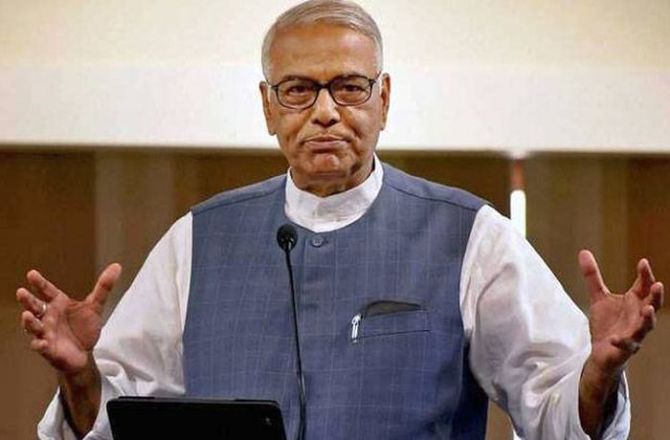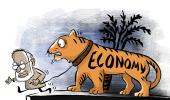Yashwant Sinha explains where the Modi government has gone wrong in its handling of the economy.

Yashwant Sinha had two terms as Union finance minister and on both occasions, he dealt with major economic crises faced by the country.
While his brief first term during 1990-1991 brought him face to face with the critical balance of payments situation, the second term during 1998-2002 saw him dealing with the East Asian crisis and the post-Pokhran economic sanctions imposed by the West led by the United States.
He is one of the few politicians whose views on India's economic situation are always considered relevant.
A Bharatiya Janata Party veteran, he left the BJP last year after floating the Rashtra Manch with an intention to bring all non-BJP parties on one platform.
A fierce critic of the Narendra Damodardas Modi government, Sinha recently released a book on its economic performance, something for which the government often pats itself on the back.
In his book India Unmade: How the Modi Government Broke the Economy, Sinha 'looks back at the Modi government's economic and development track record'.
He contends that while the Modi government was able to contain the fiscal deficit and inflation largely due to low oil prices in international markets, it manipulated the data where its performance was poor -- for example, on the jobs front.
In Mumbai recently to talk about his book, the former finance minister spoke to Rediff.com's Utkarsh Mishra in an exclusive interview.
Videos: Hitesh Harisinghani/Rediff.com.
You have written in your book that one doesn't win or lose elections based on economic performance. Yet you have based your book primarily on the government's handling of the economy. Why?
The analysis that you've presented in the book makes one think that even if the Modi government comes back with a full majority of its own, the country is on the brink of an economic disaster.
You say that the government was able to maintain fiscal discipline only because of low oil prices and by avoiding major spending on schemes.
But if it wins a second term, it most likely won't have this leverage. Which means there will be soaring fiscal deficit and rise in inflation?
If government figures about infrastructure projects, road construction and urban development are true and a lot of construction activity is going on, then why is the job situation so dismal?
When the NSSO data about unemployment was leaked earlier recently, the finance minister rejected it by saying that 6-7 per cent growth rate can't be achieved without job creation.
Another argument against the unemployment figures shown in the NSSO report was that since demonetisation and GST (goods and services tax) have erased a lot of ghost employees and shell companies, surveys are showing a decline in jobs.
Last year, when Moody's upgraded India's ranking, it mentioned demonetisation and GST as two key reforms. The government flaunted it as international endorsement of the two decisions.
The PM himself as well as his ministers often reiterate that this is the first government in history which has no major charge of corruption against it after a five-year term.
You are one of the petitioners who filed a plea in the Supreme Court seeking review of its order on the Rafale deal.
What's new in this petition and how do you react to the Comptroller and Auditor General report on the deal saying it was cheaper than the one the United Progressive Alliance government was negotiating?
You have been working to bring non-BJP parties on one platform and that's the idea behind your Rashtra Manch.
Do you see the Opposition uniting against the BJP before the country goes to polls?
Is not having a consensus leader coming in the way of Opposition unity?
One personal question which many would like to ask. It is often pointed out that Mr Jayant Sinha, your son, is a minister in a government you so strongly criticise. You also personally criticised him when he garlanded the accused in a mob lynching case?
So how does he respond to all that? Do you discuss politics at home?
What do you have to say about the government's Kashmir policy?
Do you think the recent air strikes will help in curbing cross-border terror?
You have praised Telangana's input assistance scheme to farmers. What do you think about the Modi government's Kisan Samman Nidhi scheme announced in this year's Budget which gives Rs 6,000 a year to farmers? Why do you think the Telangana scheme is better?
You are critical of the government for being unable to solve the NPA crisis at the right time. But is also a fact that most of NPAs were uncovered only after RBI-mandated Asset Quality Review.
Moreover, the new RBI notifications changing the definition of stressed loans and NPAs also contributed to the rise in bad loans.
To what extent can the government be blamed for ballooning NPAs and how much blame do the public sector banks share for their recklessness?
Why is it wrong for a government to demand extra capital from the RBI which already has reserves more than any other central bank in the world and much more than what is mandated by the RBI Act?












 © 2025
© 2025